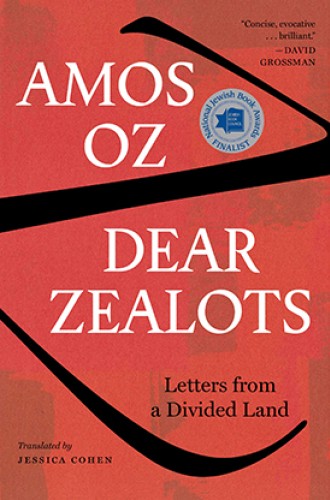An Israeli writer’s final word to his fellow citizens
Amos Oz feared that fanaticism was rising in Israel as well as in the West.
Israeli author Amos Oz has for many years been an important and respected voice for peace, a conscience for his society. A prolific thinker and writer with some 40 books—a mix of fiction and nonfiction—to his credit, Oz has been a staunch advocate for peace with Palestinians and for two separate states. He personifies the aspirations and vision of the Israeli political left. This slim volume is the last word from Oz, who died in December at the age of 79. The book is almost an ethical will addressed to his countrymen, a call for a change not only of political direction but of heart.
Oz fears that fanaticism and zealotry are rising in Israel as well as in the West. Fanaticism is not limited to religious communities or political extremists. It is a primordial characteristic of the human condition, a contagion that slithers into every sector of society. “How does one cure a fanatic?” he asks on the first page, admitting that he brings no grand plan, no secret power or military wisdom for defeating armed zealots. If fanaticism is to be defeated, it must be done in novel ways, Oz suggests, touting the value of curiosity and imagination.
Reaching out to those whose opinions differ from his own, Oz intends to explain, illuminate, and, if possible, convince. The book is neither a psychological exploration of a mindset nor a sociological treatise on the use of aggression, which he abhors more than violence. It is an anguished cry, an extended question about the life or death of the state of Israel as a state of the Jewish people.
In the book’s third and briefest essay, “Dreams Israel Should Let Go of Soon,” Oz writes despairingly of Israel’s victory in the Six-Day War:
When the shofar was blown at the Western Wall . . . a genie was let out of the bottle. Since that day, Israelis both religious and secular, on the right and on the left, have obsessively debated the question of where the State’s borders shall [be]. . . . The question of borders is a weighty one, but only an obsessive considers it the most important of all. What occurs inside the borders is exponentially more important than what their outline should be.
Oz is outraged by the frequent use of the word irreversible. To him, neither the occupation nor the settlements are irreversible. Words like forever, never, and not for any price have a lifespan of six months to 30 years, he says. “There must be compromise. . . . The opposite of compromise is fanaticism and death.”
While not a religiously observant Jew, Oz, like many of his generation, is steeped in the Jewish Bible and commentaries. In the book’s second essay, “Many Lights, Not One Light,” Oz lauds Jewish culture while dismissing ritual punctiliousness and pious obeisance to rabbinic authority as forms of fanaticism. He praises Jewish rebelliousness against injustice—even God’s. Discussing the story of the binding of Isaac, Oz agrees with some commentators that Abraham failed God’s test when he went willingly to sacrifice his son rather than challenging God’s call.
Oz reduces all 613 of the commandments in the Torah to one: “Cause no pain.” The Jewish culture that demands justice for the poor, the widow, the orphan, and the disenfranchised was built on the creative energy produced in the tension between priest and prophet, between Pharisees and Sadducees, between the pious and the enlightened and “between Zionists and anti-Zionists,” he says. “The climate of disagreement is often the right climate for a life of creativity and spiritual renewal.” Fanatics, he notes, do not argue. They seek conformity; they reject creativity and change.
This is not Oz’s best work. Fans familiar with his lyrical fiction will find the writing choppy and inconsistent. There is little here that he and others have not said before regarding the need for peace and the desire for a separate state for Palestinians alongside Israel. But coming from Oz now, after his death, these themes are worth revisiting.
For those who don’t know Oz, reading Dear Zealots is a chance to sit at a café table with an elder statesman, a sabra born before the establishment of the state, who continued to care about Israel’s future. “My Zionist point of departure,” he writes, “has been a simple one: we are not alone in this land. . . . I say the same thing to my Palestinian friends: you are not alone in this land.”






